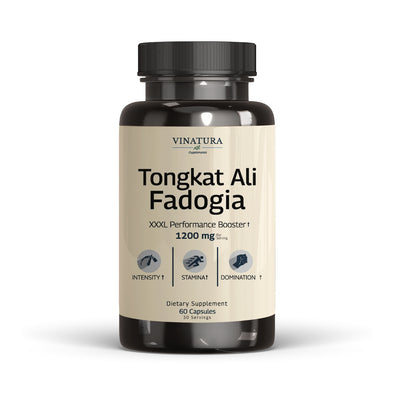
Does Shilajit Increase Sperm Count?
Shilajit is a name that is no longer unfamiliar to those interested in health supplements. Not only does it work as an antioxidant and enhance overall energy, but Shilajit is also renowned for improving sexual health.
Alongside, many customers wonder: Does Shilajit increase sperm count? What's the reality? The article below will help you find specific information.
Before exploring further, please read the disclaimer located at the end of this webpage.
Does Shilajit Increase Sperm Count?
Shilajit is a very effective natural compound in increasing sperm count and improving male reproductive function.
A study has shown that Using Shilajit twice a day, after main meals for 90 days, demonstrated a significant increase in total semen and serum testosterone levels in over 60 male infertility patients [1].
The results also indicated an improvement in sperm motility and a reduction in pus and epithelial cells compared to the beginning.
How Does Shilajit Improve Sperm Count?
Research indicates that, besides unhealthy living habits such as alcohol consumption and smoking, a reduction in sperm count also arises from high levels of free radicals in cells.
Free radicals cause oxidative stress in reproduction, reducing the number and quality of semen in men and male animals [2].
Furthermore, Shilajit is known as an herb that contains fulvic acid compounds that are effective in antioxidation at the cellular level [3].
Additionally, Shilajit contains numerous minerals and trace elements beneficial for men's reproductive health.
Therefore, regular use of Shilajit helps improve sperm count and semen quality, as well as significantly increasing testosterone levels in men.
The Relation of Sperm Count, Testosterone And Men's Health

The relationship between sperm count, testosterone, and men's health is closely linked.
Where sperm count is the number of sperm cells in a male's ejaculate, recommended to be over 15 million/ml of semen (according to the World Health Organization - WHO), and testosterone is the primary sex hormone in men.
Testosterone directly affects sperm production, acting on the testes to stimulate spermatogenesis—high levels of testosterone lead to a high sperm count and vice versa.
Additionally, sperm count also directly impacts reproductive health issues in men. Low sperm counts and low testosterone levels can both be signs leading to pathologies such as infertility, erectile dysfunction, reduced sexual desire, etc.
In summary, balanced testosterone levels help the male body produce the necessary amount of sperm and contribute to improving the sexual life as well as reproductive function in men.
Learn more: Shilajit Dosage For Erectile Dysfunction - ED?
Benefits of Shilajit for Sperm Count and Men's Health

Does Shilajit increase sperm count? Yes. To explain further, below are specific benefits of Shilajit for male reproductive health:
Sperm Production
Shilajit significantly increases sperm count by about 37.6% [1], also helps reduce swelling and pus, and fights impotence in men.
Sperm Motility
Shilajit enhances the mobility of sperm. Studies show that after more than 90 days of use, infertile male patients have a significant increase in sperm movement by about 12.4% - 17.4% [1].
Not only that, the herb Shilajit also helps enhance the health and quality of sperm.
Increase Testosterone Level

As a compound, Shilajit helps boost testosterone levels in men.
Research indicates that, with the habit of supplementing a dose of 250mg twice a day, carried out continuously for 90 days, the results showed a significant increase in total testosterone, free testosterone, and dehydroepiandrosterone (DHEAS), while the levels of gonadotropin hormones (LH and FSH) were also well maintained [4].
Support Sexual Performance
Shilajit prolongs endurance, prevents premature ejaculation, and improves sexual performance. It contains effective antioxidant compounds, facilitating good blood flow to the male genital area, reducing stress, and enhancing arousal.
In addition, men with chronic fatigue syndrome can also overcome it by using Shilajit to boost energy.
You may also like: Shilajit Benefits For Skin And Acne & How To Use It For Skin?
Incorporate Shilajit into Your Diet to Improve Sperm Count and Overall Health
The daily usage dose of Shilajit is 500mg/day divided into two doses after each meal [1]. Shilajit is distributed in various forms; corresponding to each form, you can combine it with your diet as follows:
Shilajit in powder form: Mix 2 - 4 pinches of Shilajit powder with honey or warm milk for consumption. With this formula, you should drink it twice a day, after the main meals.
Shilajit capsules and tablets: Take 1 capsule with milk or warm water after meals and use it twice a day.
Black tea Shilajit: Mix half a teaspoon of black tea and 750ml of water in a saucepan and boil for 5 minutes. When the tea is completely dissolved, use a strainer to remove the tea residue. Add two pinches of Shilajit powder to the tea mixture and stir well. You should drink Shilajit tea after breakfast for the best effect.
However, you should be aware that the high dosage use of Shilajit can cause side effects such as allergies and a burning sensation... Or there might be interactions with some substances in your diet and prescription drugs.
To ensure safety, consult a doctor before consumption to find the most suitable usage method for yourself.
Other Ways to Improve Sperm Count
In addition to using Shilajit, you can apply the following methods to improve sperm count:
- Supplement foods rich in zinc, vitamin C, E, B12, folic acid, and omega-3.
- Eat plenty of fruits, vegetables, whole grains, and lean protein.
- Limit processed foods, fast food, fatty foods, and sweets.
- Drink enough water every day.
- Sleep enough from 7 - 8 hours daily.
- Do exercise regularly.
- Limit smoking, alcohol consumption, and the use of stimulants.
- Supplement dietary supplements to enhance reproductive health.
- Periodically visit and consult with specialist doctors.
Frequently Asked Questions
Does Shilajit Increase Testosterone In Females?
Women can use Shilajit to enhance fertility. However, studies on Shilajit's effect on increasing testosterone levels in women are still limited. Therefore, you should consider. At the same time, Shilajit is harmless, but it still has potential risks, especially with pregnant women and nursing mothers; you should consult a doctor before using Shilajit for this purpose.
Does Shilajit Improve Fertility?
Shilajit can improve reproductive function in both men and women. However, this function will be more vital in increasing testosterone levels, stimulating sperm production, and enhancing sexual performance in men.
Which Herb Is Best for Increasing Sperm Count?
Various herbs can help increase sperm count, such as Shilajit, Tongkat Ali, Ashwagandha, Bindii, Shatavari... All provide good effects on male reproductive functions. However, which herb yields the highest effectiveness depends on individual needs and adaptability. It is advisable to consult the active ingredients, primary benefits, and expert opinions to find the suitable one.
Can Ashwagandha Increase Sperm Count?
Regular use of Ashwagandha can increase sperm count in men, balance hormones, improve testosterone levels, boost libido, and enhance the quality and mobility of sperm.
Conclusion
The above content relates to the topic: Does Shilajit increase sperm count? Shilajit is recognized for offering numerous benefits to male sexual health, especially in increasing the quantity and quality of sperm.
Before consumption, seeking expert advice and using it in appropriate doses is recommended to ensure safety.
References
- [1] Biswas, T. K., et al. “Clinical Evaluation of Spermatogenic Activity of Processed Shilajit in Oligospermia.” Andrologia, vol. 42, no. 1, 1 Feb. 2010, pp. 48–56, pubmed.ncbi.nlm.nih.gov/20078516/, https://doi.org/10.1111/j.1439-0272.2009.00956.x.
- [2] Inwati, P, et al. “Effect of Herbs to Protect Oxidative Stress in Sperm and Male Fertility: A Review.” ~ 2550 ~ the Pharma Innovation Journal, vol. 11, no. 5, 2022, pp. 2550–2554, www.thepharmajournal.com/archives/2022/vol11issue5/PartAE/11-6-11-874.pdf. Accessed 11 Apr. 2024.
- [3] Schepetkin, Igor A., et al. “Complement-Fixing Activity of Fulvic Acid from Shilajit and Other Natural Sources.” Phytotherapy Research, vol. 23, no. 3, 23 Dec. 2008, pp. 373–384, https://doi.org/10.1002/ptr.2635. Accessed 6 July 2022.
- [4] Pandit, S., et al. “Clinical Evaluation of Purified Shilajit on Testosterone Levels in Healthy Volunteers.” Andrologia, vol. 48, no. 5, 22 Sept. 2015, pp. 570–575, https://doi.org/10.1111/and.12482.
- [5] Usharani, P, and N Chandrasekhar. “Shilajit Extract Reduces Oxidative Stress, Inflammation, and Bone Loss to Dose-Dependently Preserve Bone Mineral Density in Postmenopausal Women with Osteopenia: A Randomized, Double-Blind, Placebo-Controlled Trial.” Phytomedicine, July 2022, p. 154334, https://doi.org/10.1016/j.phymed.2022.154334.
Author

Product Disclaimer
Including an ingredient or study does not evaluate, endorse, or recommend any Vinatura product or any third-party product. Some ingredients discussed may not be used in any Vinatura product.
The content of the articles has not been evaluated by the Food and Drug Administration (FDA) and is not intended to promote or endorse any specific product. Any products sold on this website are not intended to diagnose, treat, cure, or prevent any disease.
Opinions and Endorsements
Any claims, statements, or opinions expressed in the articles are those of the author(s) and do not necessarily reflect the views or opinions of the manufacturers of the dietary supplement products. The products sold on this website are separate from the content of the articles and are not directly endorsed or associated with the information presented here.
Liability Disclaimer
The author(s) of the articles, website, and manufacturers of the dietary supplement products do not assume any liability for any potential consequences arising from the use of the information provided in the articles. Ingredient effects, dosages, and safety vary by individual, formulation, and context; some ingredients interact with medications or may be unsuitable during pregnancy or lactation. It is recommended that individuals consult with a qualified healthcare professional before making any dietary or lifestyle changes, including the use of dietary supplements.
Product Usage
Please refer to the product labels and packaging for specific usage instructions and guidelines for the dietary supplement products sold on this website.
Customer Support
For any concerns or questions regarding the dietary supplement products, please contact our customer support team, who will be more than happy to assist you.






Leave a Comment
Be the first to comment.
What do you think?